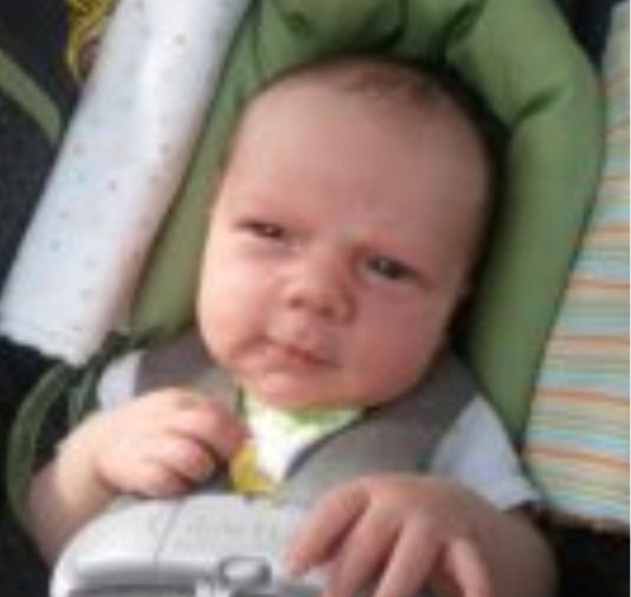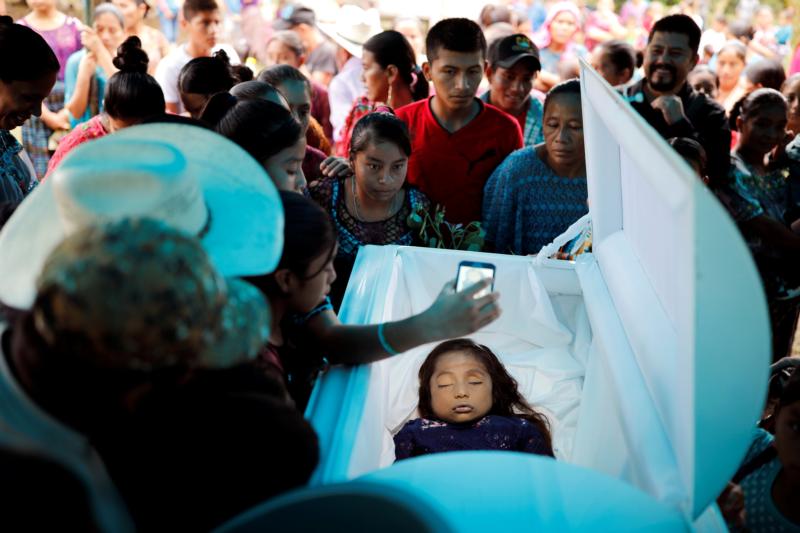A very common grief reaction after perinatal or SIDS death of an infant is intense preoccupation with thoughts and images of the dead baby. According to several studies, between 65 and 95 percent of mothers and 51 and 85 percent of fathers report problems with preoccupation or irrational thoughts about their dead baby during the acute phase . Many parents report a sense of the baby's presence—of hearing their dead baby cry—and some mothers say they feel fetal movements for months after the delivery. Others report illusions or hallucinations that their baby is still alive.
This can be disconcerting to parents and family members; however it is reported in studies of many bereaved parents. Like many other traumatic events, the death of an infant challenges parents' assumptions about their own and their families' safety in the world. Anger and irritability about the injustice and unfairness of losing their child are common grief responses and may be directed toward health care professionals, their spouse, God, or fate. Alternatively, these may be emotions directed inward toward themselves resulting in lowered self-esteem, self-blame, and depression. Parents also experience intense anger and jealousy toward other parents who have living babies. The authors found that many breastfeeding mothers and caregivers do sleep with their infants whether intentionally or unintentionally.
Deaths are less common among older children than among infants, with accidents, especially among adolescents, the most frequent cause. Cancer is the leading illness cause of death in children and adolescents. Parents who experience the death of an older child usually have many of the feelings already discussed in relation to infants.
However, more is known about the grief of parents of children who die of an illness than about the grief of parents whose children die suddenly by accidents, homicide, suicide, natural, or man-made disasters . Retaining parents in need of assistance who have experienced sudden death in formal longer-term bereavement services remains a challenge . These organizations have been the focus of significant studies on the services they provide to parents .
4.A family and interpersonal focus is essential, whether the primary target of the intervention is the parent or the child. The parents' management of their own grief and construction of the meaning of the loss has an enormous impact on surviving children. Similarly the parents' own positive mental health and ability to fulfill important life goals going forward contributes to a stronger support system for surviving siblings. Trauma theories and grief theories developed in separate literatures, and only recently has research begun to integrate the findings, concepts, and responses related to these overlapping but distinct conditions [45–48]. Grief therapies have also been found effective in situations of complicated grief, of which traumatic grief is one example .
A failure to address the intertwining of these symptoms of trauma and loss early in their bereavement may compromise the individual's capacity to experience optimal recovery. For example, cognitive behavioral interventions suggested for trauma symptoms in a treatment manual by one research team include stress inoculation therapy, gradual exposure, and cognitive processing. Gradual exposure aims to separate overwhelming negative emotions such as terror, horror, extreme helplessness or rage from thoughts, reminders, or discussions of the death of the loved one. Cognitive processing aims to identify, correct, and challenge thoughts about the death that are unhelpful or inaccurate (for example "my dad must have suffered terrible pain during the explosion in the WTC").
Nader describes convincingly how trauma prevents reminiscence necessary to grieve by evoking feelings of terror . Conversely, grief can also act as a traumatic reminder to the individual who may be experiencing a sub-clinical response to trauma or meet criteria for a formal diagnosis of PTSD, increasing anxiety in either situation. Those bereaved by deaths seen as nontraumatic are more apt to focus on their relationship to the deceased as an important feature of the experience of loss . The death of a child of any age is a profound, difficult, and painful experience.
While bereavement is stressful whenever it occurs, studies continue to provide evidence that the greatest stress, and often the most enduring one, occurs for parents who experience the death of a child [1–6]. Individuals and families have many capabilities and abilities that allow them to respond to interpersonal loss and to emerge from the experience changed but not broken. The few studies that have compared responses to different types of losses have found that the loss of a child is followed by a more intense grief than the death of a spouse or a parent . This conclusion must be considered cautiously, however, since these studies have typically confounded sample differences in age and degree of forewarning . Forewarning is important because according to the Centers for Disease Control and Prevention , about half of child deaths occur during infancy, most with limited preparation time.
Unintended injuries are the leading cause of death in children age 1 to 14 and account for more than half of all deaths among young people 15 to 19 years of age. In addition, while the overall death rate for children aged 14 and younger has declined substantially since the 1950s childhood homicide rates have tripled and suicide rates have quadrupled . Perinatal grief is framed within a social context in which a perinatal death is not recognised as the death of a baby . Research shows that after a perinatal death, parents receive inaccurate information too late and receive inappropriate comments from healthcare professionals .
In Spain, unlike in other countries, there is no standardised care for families suffering perinatal grief, with a great variability of care in daily practice for mothers and fathers who suffer the death of their baby . In general, parents of infants who have died from whatever causes share the experience that their friends and family do not know their infant, that they may not recognize or empathize with the full extent of their loss . Many parents of infants who die report being particularly stressed by people who avoid any discussion of the loss or offer clichés or dismissing statements such as "you can have another child". The advice to have a new child as a way of bypassing or avoiding the pain of loss for the particular child who died remains controversial because findings from research are contradictory . Friends as well as other family members may be impatient about the "slow" rate of parents' recovery from the loss.
As in most forms of bereavement, depressive feelings are often present following this type of loss. In fact, bereaved parents have been found to experience elevated symptoms of depression more than two years following perinatal death of their child . Therefore interventions that provide practical and emotional support, skills training, and respite throughout the often long and crisis-filled period of the child's illness may aid families' bereavement. The vast majority of newborn deaths take place in low and middle-income countries. In settings with well-functioning midwife programmes the provision of midwife-led continuity of care can reduce preterm births by up to 24%. MLCC is a model of care in which a midwife or a team of midwives provide care to the same woman throughout her pregnancy, childbirth and the postnatal period, calling upon medical support if necessary.
With the increase in facility births (almost 80% globally), there is a great opportunity for providing essential newborn care and identifying and managing high risk newborns. However, few women and newborns stay in the facility for the recommended 24 hours after birth, which is the most critical time when complications can present. In addition, too many newborns die at home because of early discharge from the hospital, barriers to access and delays in seeking care. The four recommended postnatal care contacts delivered at health facility or through home visits play a key role to reach these newborns and their families.
That's the approach in the United Kingdom, where maternal deaths are regarded as systems failures. Coroners also sometimes hold public inquests, forcing hospitals and their staffs to answer for their mistakes. There is no way of protecting children from the fact of the death and the resultant distress and grief of the parents and other family members. Children are astute observers of behavior, especially the behavior of their parents.
They need to know why parents are behaving so differently now. Children do notice the grief and depression of adults around them. Some of the tears, grief, and pain of the parents should be shared with them and they need opportunities, when ready, to share their own sad and often times scary feelings.
They need to grieve with the family by being given opportunities to be involved in funeral and grieving rituals. When the child's death can be anticipated, evidence suggests that effective management of the terminal illness period may also benefit the family's bereavement. Wolfe also found that families may be helped during this highly stressful period by mental health interventions. Complicated grief in adults refers to bereavement accompanied by symptoms of separation distress and trauma .
These symptoms must have lasted at least six months and led to significant functional impairment. Because parents of children who die are at greater risk for traumatic stress symptoms and emotional dysregulation, they are at greater risk of complicated grief . Integrating the loss of a child into the life narrative, making sense and new meanings of such a wrenching event, presents a challenge to parents and family . Although once common, deaths of children between the ages of 1 and 14 now account for less than 5 percent of all deaths in the United States; about 57,428 infants, children, and adolescents died in 1996. In contrast to the past when families might have had several children die, death in childhood is now rare.
Conflicting with current life-cycle expectations, the death of a child may be experienced as the death of the parents' future dreams as well as creating a profound change in their present roles and functioning. Increases in the incidence of suicide and homicide in adolescents and random acts of violence in our society have increased the risk of traumatic stress responses for bereaved family members. The objective of this study was to describe and understand the experiences and feelings of mothers and fathers who have suffered a perinatal death. The study findings suggest that some parents perceive "there is something wrong with the pregnancy" and anticipate the foetus loss. This could be influenced by either previous experiences or physical signs that make them suspect. The baby's death triggers an emotional outbreak characterized by shock, pain and sharpened by the feeling of loneliness.
Parents need to legitimize grief, giving identity to the dead baby, saying goodbye to him and participating in rituals according to their beliefs. When a child dies, whether a baby, a child, or an adult child, there may also be grandparents who also grieve. Grandparents experience the same feelings of grief as parents, albeit the loss is a different experience.
It is particularly difficult for grandparents to experience a grandchild's death when they feel their lives have been lived fully but the child's life was severed prematurely. Especially when an adult child has died, the grandparents' feelings of loss and grief are often not acknowledged. As a result, grandparents may not get the support they need. Too, some elderly adults do not easily share their feelings with others, even their own children. Parents may feel angry toward the health care team for not saving their child or for poor communication that left the parent confused and unsupported.
Parents of teens and adults who died under circumstances in which their friends' behavior and lifestyles contributed to the death may fuel anger toward the child or the child's friends. Although difficult to express when a child dies by suicide, parents may feel anger toward the child for not sharing their emotional state, for not seeking help, or for they themselves believing they should have seen signs. Some may feel anger towards friends who have children and the friends having the good fortune to be able to watch them grow older and reach particular milestones such as graduation or marriage.
Big countries like Brazil and China reduced their child mortality rates 10-fold over the last 4 decades. Other countries – especially in Africa – still have high child mortality rates, but it's not true that these countries are not making progress. In Sub-Saharan Africa, child mortality has been continuously falling for the last 50 years (1 in 4 children died in the early 60s – today it is less than 1 in 10). Over the last decade this improvement has been happening faster than ever before.
Rising prosperity, rising education and the spread of health care around the globe are the major drivers of this progress. Two hundred years ago the child mortality rate was extremely high around the world –more than 40% of all children died. Since then the child mortality rate has declined more than 10-fold.
Because we need to further reduce child deaths we are studying the causes of death of children today and how it was possible to improve child health so very substantially in the past in ourentry on child mortality. With the dramatic increase in the survival of low birth weight babies, the death of a very tiny, sick, or deformed newborn is no longer always expected. Parents' hopes may be buoyed with the suggestion of each additional medical procedures, and the added time that the child lives increases their attachment. The advent of new technologies and surgical procedures that might prolong survival but at a price of pain, discomfort, or survival with gross disfigurement or retardation presents new problems to both parent and physicians. This situation may engage them in complex legal and ethical issues that intensify the emotional difficulties parents have in dealing with their loss.
The majority of studies on this issue have focused on divorce as an indicator of stress upon the parents. However, there is a great deal of variability across studies regarding the divorce rates following a child's death. A recent review of these studies concluded that some writers give overly high estimates of divorce for which there is no empirical support . On the other hand a substantial minority of couples do seem to experience severe marital distress. Bohannon , for example, conducted a longitudinal study of couples' grief responses and marital functioning.
Died From Lack Of Attention About the same proportion had considered divorce after the death of their child. A major difficulty in doing such research is that the frequency of divorce in the U.S. population is about 50 percent. Separating the "real" contribution of the death of a child from other causes of marital strife in bereaved families is a difficult research challenge. New Jersey's review team, the second-oldest in the U.S., includes ob/gyns, nurses, mental health specialists, medical examiners, even a nutritionist. Every few years, the committee publishes a report, focusing on things like the race and age of the mothers who died, the causes of death, and other demographic and health data. In the past, the findings have been used to promote policies to reduce postpartum depression.
The requirement of a combination of factors including a specific underlying susceptibility, a specific time in development, and an environmental stressor has been proposed. These environmental stressors may include sleeping on the stomach or side, overheating, and exposure to tobacco smoke. Accidental suffocation from bed sharing (also known as co-sleeping) or soft objects may also play a role. Another risk factor is being born before 39 weeks of gestation. SIDS makes up about 80% of sudden and unexpected infant deaths . The other 20% of cases are often caused by infections, genetic disorders, and heart problems.
While child abuse in the form of intentional suffocation may be misdiagnosed as SIDS, this is believed to make up less than 5% of cases. It is not uncommon to feel anger toward others in society, especially friends and family members who do not acknowledge the child, or who discount parental grief responses and go on as if the child's death did not happen. Couples who experience a miscarriage may experience their grief all alone, as few people may have known of the pregnancy loss. What this also means is that the share of child deaths from older or younger children also depends on how much progress countries have made on vaccine coverage and other interventions.
There, neonatal deaths account for only 37% of under-5 deaths, whereas in most Asian, European and American countries this share is 50% or higher. This is because many countries across Sub-Saharan Africa still have significant progress to make in the prevention of vaccine-preventable diseases. Our concern will then turn towards countries where the chances of child mortality is high, and the number of births increasing.
Countries where children are most likely to die – Somalia, Chad, Central African Republic, Sierra Leone, Nigeria, and Mali – will all have an increasing number of children in the coming decades. Progress on reducing child deaths will here therefore become a race between declining child mortality rates and an increasing number of children. Of course, the death of every child is an enormous tragedy, and in many countries far too many children die because of causes we know how to prevent and treat. The deaths of infants, either through miscarriage, stillbirth, newborn death, or SIDS, were until recently regarded even by most professionals as "nonevents" or "non-deaths" affecting unnamed "non-persons" .
While there are common issues in bereavement for all infants, each of these circumstances of infant death brings its unique stresses related to the way in which it occurs as well as to the individual parent . The fourth Millennium Development Goal aims to reduce the 1990 mortality rate among under-five children by two thirds. Child mortality is also closely linked to MDG 5- to improve maternal health. Since more than one third of all child deaths occur within the first month of life, providing skilled care to mothers during pregnancy, as well as during and after birth, greatly contributes to child survival.

























